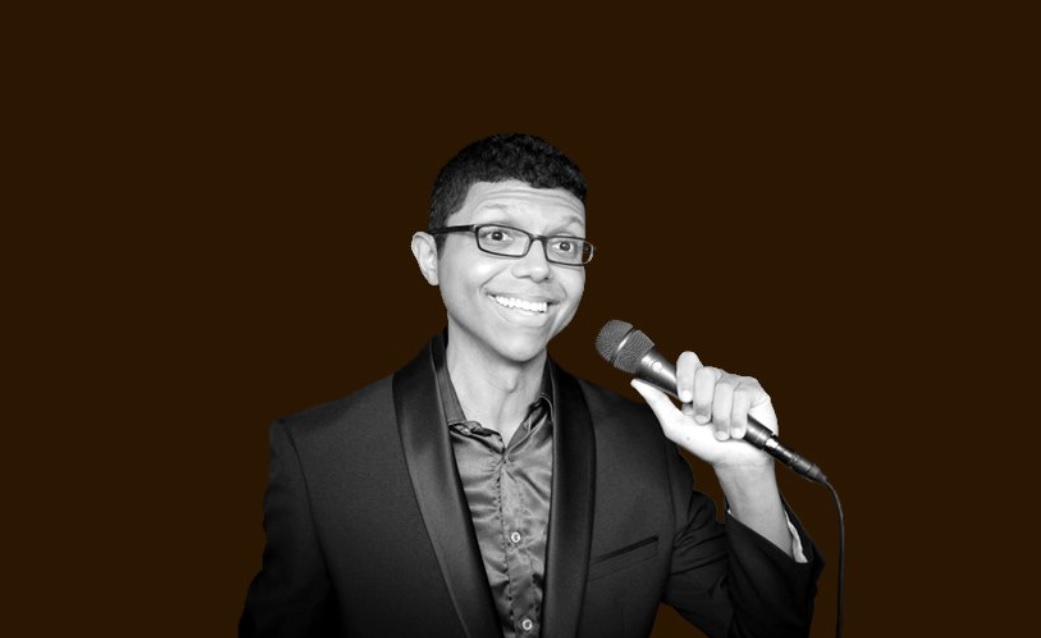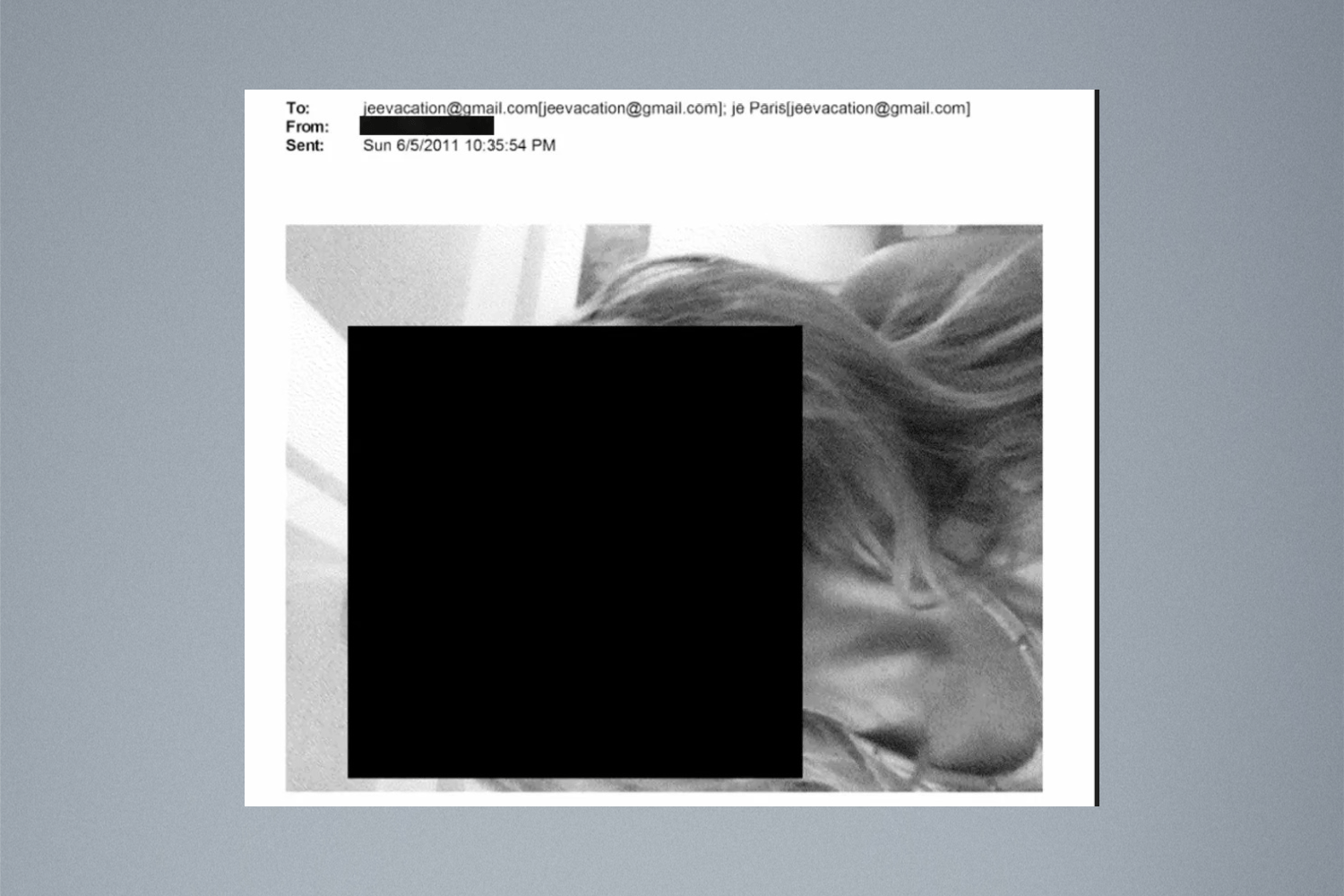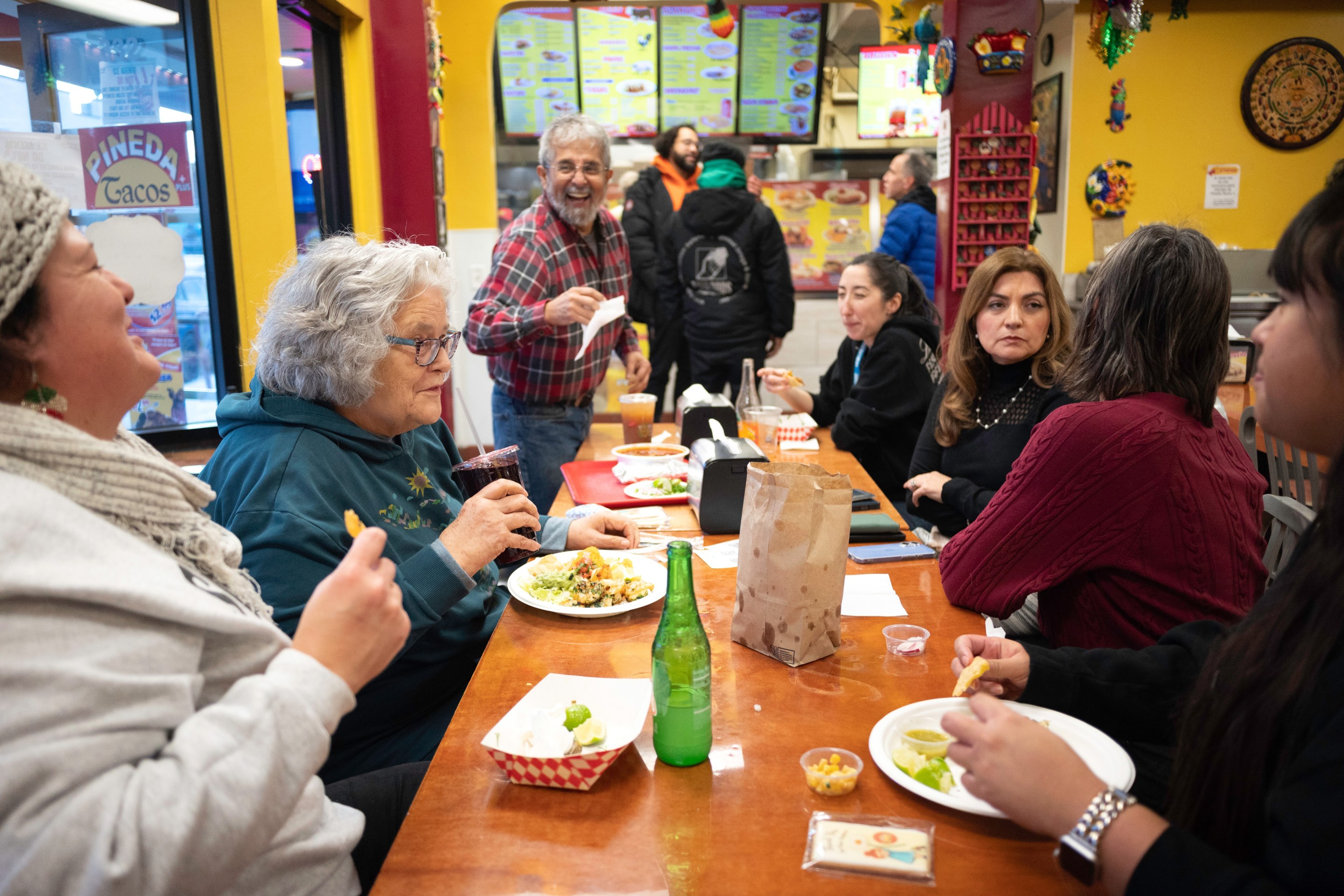Tay Zonday isn't a surface-level thinker. When the early YouTube star says the internet was "dumber" in 2007, the year the world first heard his bass-vocal theatrics on "Chocolate Rain," he isn't talking about frivolities like Facebook "pokes" or AIM bots. Instead, Zonday means the internet of 15 years ago hadn't yet mutated into "a bizarre spaghetti of oligarchic fiefdoms that spy on us and lie to us to keep us consuming advertisements."
We expected puffier dialogue when we reached out to Zonday for an interview, one he expressed regret over in real-time. His era of memedom easily slips into cheap, nostalgic BuzzFeed listicle territory, and even back in '07 it wasn't easy to nail down Zonday's artistry. "Is 'Chocolate Rain' the product of a talented songwriter having a laugh," asked a befuddled City Pages profile at the time, "or a fascinatingly naïve outsider who happens to have actual vocal chops?"
Turns out it was more of the latter. Pop culture deeming "Chocolate Rain" a novelty song "didn’t hurt my feelings," says Zonday, now 39. "But I also felt very lost." One decade and 100 million-plus plays later, he revealed in 2017 that "Chocolate Rain" is actually a piano-ballad meditation on institutional racism. Joke's on us for not realizing sooner: "Chocolate rain / History quickly crashing through your veins / Chocolate rain / Using you to fall back down again."
The real-life Adam Bahner can't help, as you'll see below, dissecting society's innumerable systematic malignancies. But the one-time Minneapolitan isn't immune to self-reflection either, as you'll also see in our lengthy email conversation. "Experiencing life—and especially failure—has led me to take a deeper look inward over the past three years," says Zonday, who opens up with great candor about his whirlwind viral-video era and struggles related to his autism spectrum disorder.
Playing Kimmel was a sensory nightmare. Navigating Hollywood's backslapping phoniness proved exhausting. And parlaying surprise overnight fame into a sustainable show-biz career hasn't been easy, though Zonday does collect a "modest" income from song royalties, voiceover work, and his Cameo account. "If I was 22 again, I might pursue a nice, boring job at the Social Security Administration," he tells us.
Reflective, funny, and insightful, Zonday gave us too much good stuff, so we didn't cut any of it. Throw on "Chocolate Rain," and get to know a talented, fascinating individual who, 15 years later, is a lot less naïve.
You mentioned you were moving in January. Are you still based in L.A.?
I’ve been Seattle-based since early 2021. Before that, I lived in Los Angeles for 12.5 years.
When I left Minneapolis for Los Angeles in 2008, a friend at the time warned me to keep Minneapolis inside of me. He warned me that Hollywood had a vibe he did not like. He was right, although in ways I didn’t know at the time. Hollywood can be shallow. It can invite every interaction to be transactional. The stereotype that Hollywood have-nots circle successful narcissists like vultures is true.
There’s a networking game to play in Hollywood. There’s a vocabulary of dishonest ovations that people use like law-enforcement radio codes. “We’ll be in touch” means “go f--- yourself.” “I’ll consult with the leadership team” means “go f--- yourself.” “We’re on a really tight schedule” means... come to think of it, most Hollywood code-phrases mean “go f--- yourself.”
My favorite stars create live one-person, two-person, and musical theater shows at the Minnesota Fringe Festival. Many of them go back to welding pipes, writing grants, or running day-cares for a living. Maybe they didn’t end up in Carnegie Hall, but the Bryant-Lake Bowl is more honest and convenient. There are so many Twin Cities artists with Susan Boyle stories and talent who don’t get Susan Boyle breaks. But they’re okay. They’re full. They keep on keeping on.
The theater scene in Los Angeles is different. Either you’re a union/equity actor and able to eek out a modest (but not lavish) living in a very disperse “New-York lite” ecosystem spanning from San Francisco to San Diego... or you’re in the improv comedy theater grind to compliment your ambitions as a writer, director, or actor. I never found a “local” Los Angeles theater scene akin to the Twin Cities. I never found people akin to the Twin Cities. Nothing like Leslie Ball’s BALLS Cabaret which ran for 29 years. Nothing like In The Heart Of The Beast’s MayDay parade which ran for more than 40. There’s nothing like a Minnesota State Fair in California that enough people go to that it's emblematic or unifying. Disneyland tries, but they showcase themselves—not the state.
Hollywood feels like a bedroom community where some people get stuck because they kept rolling the dice and ran out of homes to go back to.
Do you ever miss Minneapolis? Tell me about your life in Minneapolis growing up and at those early open mics.
I grew up in Chicago, though we had extended family in Minneapolis and visited them. I attended graduate school in Minneapolis from 2004 to 2008, pursuing a Ph.D. in American Studies. I did not finish the Ph.D. I completed the coursework and left the program with a master's degree to pursue my accidental entertainment career.
The Twin Cities are imbued with a wonderful midwestern cultural zeitgeist that deifies the ordinary. Being nonplussed is high-art in Minnesota. There might be something about brutal winters that necessitates chilling-out and friend-zoning everyone, but in a way that fuses calm acceptance with personal boundaries.
In Minnesota, the hoity-toity or prima donna thespian gets stuck in the snow like everybody else. This might condition a greater acceptance of the zany. I feel humanized in Minneapolis in a way that I don’t in New York City or Los Angeles. In Manhattan, nobody cares. In Los Angeles, people pretend to care based on the transactional value of knowing you. In Minneapolis, everyone’s generally (but not magnificently) okay... so you just keep doing you and they just keep doing them. But they’ve got a tow cable if you need it.
Wow, 15 years since “Chocolate Rain.” Personally, that makes me feel simultaneously old and nostalgic for 2007. How does the anniversary make you feel?
This is going to be a bad answer. It’s cerebral. Many will experience it as abstract:
Anniversaries are a pre-Google world’s mechanism of search engine optimization. Recurring calendar dates occasion a non-random cadence to cultural acts of acknowledgment. But why is acknowledgment a scarce resource? I’d like to think that we can live in a world where no second passes that has a scarcity of acknowledgment for what is sacred. Isn’t that how we should aspire to live our lives? Doesn’t our intelligence climax in a milieu where temporal periodicity isn’t a mnemonic summons for meaning?
If I admit to having a feeling that is temporally subordinate (as a feeling for an anniversary would be), am I not inviting myself to be dominated by the universe in a way that is disempowering? Whatever that acquiescence and domination by the universe is, I want to change the script. I want to meet the universe on equal terms.
Perhaps half of reality should be me subordinating to time and the other half should be time subordinating to me. Isn’t that more just? It’s definitely more Minnesotan. The big bang should consult Minneapolis first and redo this.
How nuts was your life after that song exploded?
A lot of people would call my life nuts in ways that have nothing to do with public exposure. This question presumes a “non-nuts baseline” that I have never experienced.
However, overnight worldwide recognition took my already-unusual life and added experiences that most people don’t have. I did dozens of radio interviews over a period of weeks in the summer of 2007. I fielded hundreds of solicitations to co-author books, sign with major music labels, perform at private events, and do brand deals. It was very sudden. My brother helped as a manager-caretaker but we were still overwhelmed.
In recent years, I’ve achieved a much better understanding of my psychiatric needs as an autistic adult. At the time I went viral in 2007, I didn’t understand the importance of that diagnosis. (I had been diagnosed with Asperger's, now called autism spectrum disorder, along with many other things as a teenager). I was living in a lot of sensory suffering without connecting the dots. I appeared on Jimmy Kimmel twice, opened for Girl Talk at First Avenue, and had a lot of experiences I wish I could approach with the self-knowledge that I have today.
When the curtain came up on Jimmy Kimmel and the crowd screamed, I wish I was clear that autistic hyperacusis (a neurological pain and fear response to sound) is why I felt crushed and like a ghost in my own body. I wish I knew that dyspraxia (a brain-body disconnect that often correlates with autism) is why my hands felt like cardboard and why I’ve always struggled to emote during performance or play the piano. Now I have terminology, but for much of my adult life I just suffered silently. I became frustrated because none of my efforts to emulate the best examples set by non-autistic role-models were the correct choice for me.
What are your strongest memories of that era?
Overwhelmed. Very uncertain. Very over-stimulated. Very much thrust into a spotlight. I’ve never been great at knowing who I am. I still don’t feel great at it. I invented the name “Tay Zonday” in early 2007 as an entertainment alter ego. I expected my serious life to continue with my government name, “Adam Bahner.” Suddenly, “Tay Zonday” became widely known and people began addressing me as “Tay” in business and life. Was “Tay Zonday” just a role I had to play? Or was it me?
Many people also experienced my viral song, “Chocolate Rain,” as a joke. It was widely parodied as a joke. This didn’t hurt my feelings, but I also felt very lost.
I chose not to discuss "Chocolate Rain"’s intended meaning as a ballad about institutional racism until 10 years later in 2017. Maybe it didn’t feel safe to. The world had grown up significantly by 2017. It had more points-of-reference in the wake of Trayvon Martin and other tragedies. While the song was going viral in 2007, there didn’t seem to be any space to be serious or polemic. I mean, YouTube monetized white supremacists like Stefan Molyneux all the way until June of 2020. Was there really space to reflect on "Chocolate Rain"’s lyrics while YouTube recommended David Duke’s channel?
Is there a community, a kinship between early viral video stars?
I’m on friendly terms with Gary Brolsma [Numa Numa] and Liam Kyle Sullivan [Shoes]. I appeared on Judson Lappily’s podcast [Evolution of Dance]. I’ve certainly spoken with Chris Crocker [Leave Britney Alone], PRguitarman [Nyan Cat], and a few others. There isn’t any organized society. We don’t have family reunions.
Just how different was the internet back then?
Am I a “back then?” Maybe I should embrace that.
What we call “The Internet” now is a bizarre spaghetti of oligarchic fiefdoms that spy on us and lie to us to keep us consuming advertisements.
The internet in 2007 was dumber. By this, I mean the platforms were not as sophisticated in manipulating humanity to behave in a way that amplified their business. Algorithmic content curation—changing what you see based on how the platform spies on your personal life and behavior—didn’t solidify until around 2012. It grew in tandem with—and partly in response to—smartphones becoming the dominant internet platform. Less screen real-estate raised the value of predictive recommendation.
More importantly, YouTube viral videos prior to 2012 were able to be more divisive and alienating. As I’ve said in other interviews, this was good for humanity but bad for business. Human beings need to see content they find upsetting. They need to see content they find alienating. Sometimes they need to be confused or bewildered. Sometimes showing a person bothersome truths is more important than misleading them into devoting as much of their life as possible to watching advertisements.
George Floyd was horrific to see. His murder didn’t go viral on Facebook or YouTube. They didn’t want content like that. They banned the footage. They buried the efforts of independent creators, like Phil DeFranco, to talk about it. George Floyd endangered YouTube’s advertising business. But we should all agree that his murder needed to be seen. It needed to afflict the comfortable. Twitter allowed this to happen in 2020. Facebook and YouTube did not.
Do you have a happy relationship or a complicated relationship with being known as “The ‘Chocolate Rain’ Guy”?
Who’s that? I’m not exclusively known as “The 'Chocolate Rain' Guy.” Sure, it’s a name journalists have entertained. Journalists also called Madonna “The Material Girl” and Michael Jackson “The King Of Pop.” I’ve seen them call Gloria Gaynor the “I Will Survive singer.” No offense, but journalists aren’t exactly writing at the grammatical level of Henry Louis Gates Jr. or Noam Chomsky. [Editor's note: Sure about that?] They like reduction. Their framing is risk-averse and prone to reinforce bylines rather than forge them.
That being said... whether someone calls me “Tay Zonday,” “Chocolate Rain,” “The Chocolate Rain Guy,” “That guy fromTosh.0,” “That guy from South Park” or “That guy who looks like Bruno Mars, moves like Mr. Bean, and sounds like Barry White”... I should be grateful to be remembered.
Tell me how your life and career has changed in the past 15 years, including what you’re up to today—the singing, the acting, the voicework, the Cameos.
I have never liked talking about what I do. If I’m rich from it, it feels like bragging. If I’m poor from it, it feels like begging. If I’m in-between, it feels like blabbing. I like to show up and do it. I like for it to speak for itself. Maybe there’s still some Minnesota in me.
When I moved to Los Angeles in 2008 from Minneapolis, I truly wanted to be a mainstream star. I thought that maybe I’d host a game show. Or act on-camera. But I also didn’t really know myself and—quite importantly—didn’t know that I didn’t know myself. While I made great friends and studied with great mentors, I also wrestled with major mental health struggles. I had stratospheric anxiety, nonstop environmental sensitivity, and a huge discontinuity between my public persona and my private dysfunction.
Public attention and worldwide recognition also freaked me out. I don’t blend in anywhere. I’ll play a video game like Fortnite that has tens of millions of players and use a different name. Total strangers will still recognize my voice. I feel like much more famous people can be more incognito than me. You might not recognize Lady Gaga in a hoodie and pony tail. Brad Pitt could dress down and you might not immediately notice him in your Uber Pool. There’s some combination of my face, voice, and movement that sticks out everywhere. I’m never some guy. I’m always that guy.
Being in Los Angeles, a town where there’s nonstop backroom calculus around status and clout, made my recognition-anxiety worse. I often felt “friend zoned” by fame—not famous enough to carry projects or have the world adapt to me, but also too famous to rule out ulterior motives and have a normal social or business interaction.
My favorite Dr. Seuss book is I Had Trouble in Getting to Solla Sollew. It’s a great metaphor for my pursuit of Hollywood success. Still, during my time in Los Angeles I was lucky to partake in some fun film projects, a cornucopia of TV episodes, many TV show pilots at various stages, and a whole lot of classes. I extensively studied improv comedy, stand-up comedy, voiceover, and singing. I’ve had enough life on set to see how the entertainment sausage is made. I’m no fun when watching Netflix because I’m always saying things like “that’s a crane shot”... “that’s a dolly shot”... “that’s a soundstage”... “that’s a composite shot”... “that dialogue is dubbed”... “they jump-cut takes with different levels of makeup de-shining”... “they didn’t film that with actual teenage actors because it costs three times as much” etc....
Some Los Angeles years got quite lean financially and my parents bailed me out. A lot of people who get bailed out by family don’t admit it. I have no shame. I don’t believe in meritocracy. I believe in grace and luck. Some months, my family has kept me from being homeless. In fact, my net worth right now is technically negative.
I remain grateful for the modest income I derive from music residuals, voice work, teaching voiceover, Cameo videos, and a few other ad-hoc sources. I wish I had settled into a more stable, predictable career. If I was 22 again, I might pursue a nice, boring job at the Social Security Administration. Or maybe I’d become a radiologist. Interpreting scans seems very peaceful. My high school biology teacher told me to become an actuary. I should have listened.
Your song “Mama Economy” seems to suggest some leftist politics. Is that fair to say?
No. “Leftist” in your question is deployed as a pejorative to silo me into a set of tribal assumptions. “Truth” is the only silo I slot into. Truth isn’t a demographic. Truth is not a destination in a faux cosmopolitan fantasizing of fact and fiction. Fact and fiction don’t join arms in a placid jig of civil society. They’re like matter and antimatter. I’m matter. If you’re a pocket of antimatter, you’d better stay in your magnetic field because I’m coming for you.
“Chocolate Rain” was a mainstream song about institutional racism well before that concept went as mainstream as it is today, so your work has always been political. What has it been like watching news reports from Minneapolis during and after the murder of George Floyd?
What does “political” even mean as an adjective? Every dimension of our lives is political. “Apolitical” as a concept is a lie derived from rational choice theory, one of the fallacious tenets of prevailing economic thought. It harkens back to Milton Friedman’s bastardization of John Locke and Adam Smith. Friedman’s lie is that equal access to transactional participation undergirds human equality as an extension of human nature. Therefore, markets are apolitical and individual asymmetry in sociopolitical power is a morally agnostic act of nature. This is the absurdity you still hear from CNBC, The Wall Street Journal, Bloomberg, Harvard Business School, and others. It’s designed as a plutocratic alibi so that none of the systemically guilty have to think about George Floyd. It’s designed to divorce prosperity from barbarity.
George Floyd was obviously tragic. But he also modeled American law enforcement functioning as it was historically designed to function. This doesn’t mean there aren’t great individual police officers. There are fantastic officers who choose the career for the best reasons and live heroic lives. We should celebrate noble public service. But we need to heed the words of Michael Brooks: “Be ruthless with systems and kind to individuals.” Accepting that Black victimization is an institutional teleology doesn’t mean that Derek Chauvin is the individual teleology.
The history of American law is meticulously captured in books like Douglas A. Blackmon’s Slavery by Another Name, Richard Rothstein’s The Color of Law, Nikole Hannah-Jones’s The 1619 Project, and Michelle Alexander’sThe New Jim Crow. We can’t understand the enforcement of law without a truthful understanding of its history.
In a Minneapolis context, how many Minneapolis residents ask themselves why there aren’t beautiful lakes in north Minneapolis? How many ask themselves, as they cheer the Minneapolis Aquatennial parade for decades, why north Minneapolis has been historically omitted in the floats which model regional cosmopolitanism? The breadcrumbs of systemic racism leading to a tragedy like George Floyd aren’t hiding. They scream at us in every crevice of the so-called ordinary.
I organized state-licensed home daycare providers for Service Employees International Union as a summer job. I later served on the Minneapolis Civil Rights commission. Knocking on the doors of state-licensed home daycares in Hennepin and Ramsey counties familiarized me with the balkanized, historically injurious nature of Twin Cities urban development.
If you walk through the heavenly canopy of Victory Memorial Drive in the summer—and understand how historical anti-Semitism, redlining, racist union politics, abuse of eminent domain, and other traumas contributed to the differences in generational family wealth between north Minneapolis and St. Louis Park a few miles south—then George Floyd, Philando Castile, and too many other Black victims of institutional racism are logical end points.
When you drive by the idyllic yards of Summit Avenue in St. Paul, how many Black families were reduced to de-facto domestic refugees to become infrastructure for that corridor? Bulldozing and billy clubs (which disproportionately impact marginalized peoples) are the soul of most aristocratic Minnesotan family wealth. Poor whites experienced plenty of victimization too. There just wasn’t anybody filming that depraved history to course-correct the narrative of who the prosperous claim they are today. The wealthy can’t Juneteenth and Martin-Luther-King-Day their way to milquetoast absolution. God saw what they did. Righteousness rejects all endowments.
Based on your Twitter feed, you seem bullish on Web3 and NFTs. Tell me about that.
No, I wouldn’t say I’m “bullish.” That’s over-simplified.
Why doesn’t anybody accuse me of being “bullish” about the U.S. dollar fiat economy when I post about that ecosystem? I’ve talked about spending American dollars my entire life. The prejudice of this question is that we ought to normalize fiat economics as unremarkable and blockchain economics as noteworthy. On the contrary, we should find the apocalyptic state of global fiat economics to be highly noteworthy on a daily basis.
We should look at the poisoning of Flint, Michigan, and ask why we are so "bullish" on fiat economics.
We should look at the failure to integrate municipal services (including police, fire and social services) into precinct representative government—a failure that contorts these into mechanisms that evacuate generational wealth from the poorest zip codes being served—and ask why we are so “bullish” on fiat economics.
We should look at how we still transact paper dollars that have the faces of men who enslaved and eugenically bred Black bodies from the cradle to the grave—and ask why we are so “bullish” on fiat economics.
We should look at how the hegemonic global power of the U.S. dollar devalues non-western human bodies to where some American products have raw materials mined through de-facto slavery in Africa, shipped to Asia at high carbon cost and manufactured under often-deplorable conditions, and then shipped to American consumers at high carbon cost—and ask why we are so “bullish” on fiat economics.
There are ways in which blockchain economics, including Web3 and NFTs, have created avenues for individuals to access generational wealth who were locked out of fiat economy participation. It is not perfect. But if it disrupts the unparalleled environmental and moral disaster of the status quo, we can celebrate its exploration and distributive wins.
There’s an intentional and disastrous lack of basic education about economics (thanks Milton Friedman!) that leaves people with good intentions susceptible to disinformation. Framing that erases the most clarifying questions surrounds us like fish in opaque water. This complicates public discourse about policy and the human future.
You’re still just 39. What does the future hold for Tay Zonday?
We can round up. I turn 40 in May.
I don’t know. Honestly, I’m just trying to find a way to continue not-dying and maybe even provide for my future. Writing these types of interviews is mostly time-sucking and a net-negative. However, I made the mistake of saying I’d do it. I try to be a person of my word. They say “put your own oxygen mask on before helping others.” I’m bad at that. Besides—none of us know when we’re going to die. If St. Peter plays CCTV footage of my life at the gates of heaven, would I rather go out in a selfless act with no discernible personal benefit, or an act of calculus and greed? Maybe salvation isn’t zero-sum.
Part of me wants to love singing and making music. But I’ve also become re-acquainted with my autism diagnosis, which explains a lot of my sensory sensitivities. It has been very hard for me to find creative environments that meet my sensory needs. Though as I said earlier, when I was first diagnosed with autism at age 15, I had a lot of concurrent childhood psychiatric diagnoses. Experiencing life—and especially failure—has led me to take a deeper look inward over the past three years.
I am definitely a special-needs adult. I’m still figuring out how to make my way in the world. It’s a daily battle. If I call myself the “d” word—“disabled”—which may be true... does broadcasting my “invisible” neurodivergent disability compromise my future? Like I said, the biggest hurdle may be that at key moments, it was invisible to me. I see myself.
You offered our hyper-local alt-weekly-style website valuable SEO advice. What else does Racket need to succeed?
Never paywall this. When I visited Racket to figure out what the publication was, your paywall was way too aggressive. You need to build a collection of shareable marquee articles that bypass the paywall. Those articles will be the carrots in a discovery ecosystem which attracts new readership.
Racket’s paywall is like a stick. It should mostly operate as a polite reminder to local readers that they can invest in local journalism. The paywalled content should only prompt the pay-wall after a preview of one third of the content. Switch hosts if your current host can’t configure the site like this. Last I saw, you’re not optimized for acquisition and conversion.
[Editor's note: Our developer disagrees.]
Everybody’s great at giving other people advice. The days of my life suggest that I have a lot to learn about giving myself advice and following-through with successful execution. If I’m a carpenter and modeling myself as a table, Racket might want to keep looking. I’m not a satisfied customer.







